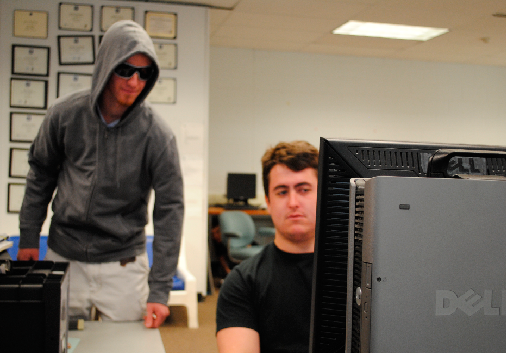Kathi Anton, 52, a business major, sits at her desk. You might expect that, like most people who find themselves stuck in front of a computer monitor, she’s periodically checking her Facebook and updating her status to report her current location, mood, and thoughts to the virtual world.
However, she actually spends little time using the social media powerhouse. Anton originally signed up on the social media website just to reunite with old friends from her past. She seems disgusted though when she signs in and sees some of the vulgar things posted by her younger friends.
“With social media there is no privacy anymore. You can’t hide from someone who wants to do you harm. All they will have to do is Google your name and they will find your Facebook page” Anton says.
Anyone can type in a person’s name through a Yahoo or Google search and their Facebook account. From there they can click on the page and see a limited amount of the user’s information and with one more click, they can add the person as a friend. And it’s not as uncommon as you may think for users to add “friends” that they don’t actually know.
“People really need to watch what they say on the computer, because once they post it, it is there forever and someone will find it to use it against you at a later date. Look at all the people that put derogatory photos of themselves on the internet and then years later it surfaces only to do them harm and embarrassment” Anton says.
According to privacy expert Jim Harper, social media today is attracting one in every fourteen people on the planet to join. Harper is the director of information policy studies at the Cato Institute and a co-editor.
“Expecting privacy on the internet today is now expecting too much” Harper said. “Facebook has been in trouble already with the privacy issues. Also, in July of 2010, Google got themselves in trouble with the use of its street view function allowing people to view others streets” Harper said.
According to Harper, privacy has hit an extreme today, in terms of allowing others to stalk people using their Facebook.
“We remember the webcam incident involving Rutgers student Tyler Clementi. He committed suicide after his roommate used a hidden webcam to stream a sexual encounter between Clementi and another man online. This is what happens when your privacy is no longer private. Something needs to happen or more stories like this will happen” Harper said.
Today social networks like Facebook and Twitter allow millions of people to see what is going on in a person’s personal life, should they choose to share it.
Cody Connor, 19, a sports management major, has been on Facebook since the day the social media site hit the web. Connor mentioned the new practice of employers asking to see applicant’s Facebook profiles as part of the hiring process.
“I think really that it’s right for now that employers ask for your Facebook password for example. As much of an invasion it is of your privacy it’s just showing that you’re loyal and honest enough to be respected with what you show online with your peers” Connor said.
Connor said that people looking for work, especially teens seeking their first job, should be weary of what they post on the internet.
“Social media and privacy issues will bite you in the long run though especially with some people out there in the world. As I said earlier if you are careful with what you do, privacy issues won’t catch up to you. Unless you release information like your passwords, numbers, and etc.” Connor said.
Computer Information Science Professor John Crowley had his own opinions about the privacy issues with social media.
“People post too much information for the public to view” Crowley said. “Everything now that they have posted will be there forever and there is no taking any of it back. It is there for good. I don’t trust any of these social medias” he said.
Crowley also suggested that posting even seemingly simple information, like vacation plans, on the internet could leave users vulnerable to crime.
“Today, teenagers are obsessed with the social medias. In general they post too much private information. Say you tell a friend that your family is going on vacation for the next two weeks. Just by posting that on Facebook to them they now know that your house is unoccupied.” Crowley said.
“With my skill set and my studies in computer information science has allowed me to see a lot. You would be amazed about what I could dig up about anyone. People today should be very careful with what they post on the internet” Crowley said.
Christie King, 22, a computer science major, has a very strong opinion about privacy issues.
“I view it as the Fourth Amendment of The Constitution. In other words, if our privacy isn’t protected it will eventually be a violation that will be argued in the U.S. Supreme Court. Today people who publicly display their information, they’re freely giving up their privacy” King said.
Privacy on the web? Don’t bet on it


